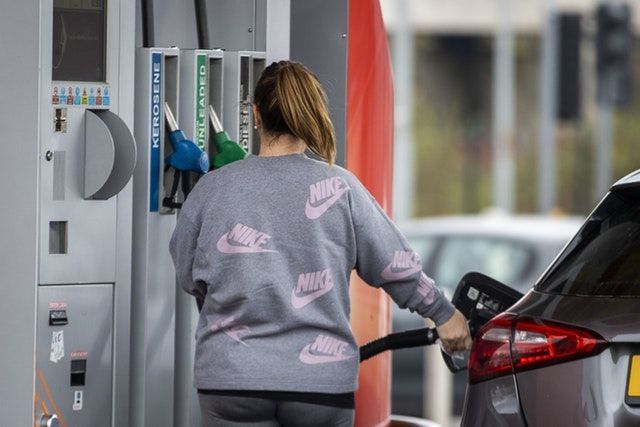Hundreds of rural and independent petrol stations across the UK will be forced to shut within a matter of weeks due to plunging fuel consumption during the Covid-19 pandemic, it was revealed today.
With the majority of the nation staying at home and told not to drive unless absolutely necessary, the decline in sales is making businesses unprofitable, according to the Petrol Retailers Association (PRA).
The news sparked dismay among some Twitter users, including a care worker who said she would be forced to stay at home if she could not buy fuel.
The PRA said in a statement: ‘Many petrol stations will have to close in the coming weeks, as sales of fuel dry up and their businesses become unviable.’
The organisation, which represents independent fuel retailers accounting for 70 per cent of the UK’s 8,385 forecourts, advised motorists to check their petrol station is still open before going to fill up.
It says it will attempt to keep a ‘strategic network of petrol stations’ open across the country.
Forecourts linked to supermarkets are likely to continue operating as normal.
The comments should not spark panic buying with Britons instructed to not use their vehicles at all during the lockdown – unless it’s for very specific reasons set out by the government.
These includes shopping for essentials, attending a medical appointment, assisting an elderly or vulnerable person, or getting to or from work if you can’t work from home.
Police forces have said that motorists are not prohibited to use vehicles to drive to locations to go for a walk or any other form of once-a-day exercising or simply to take the car out for a spin.
The PRA’s statements comes as official government figures show the enormous decline in car use since the the Prime Minister announced strict movement restrictions on Britons over a week ago.
Road traffic has plummeted to just a quarter of its normal volume since the country entered lockdown, according to a information presented by the government’s chief scientific adviser, Sir Patrick Vallance, yesterday,
The fuel retailer body said this has resulted in fuel consumption falling by more than 70 per cent due to the pandemic.
Brian Madderson, chairman at the trade body, said: ‘To help freight move and help key workers travel safely and independently through this period of crisis, petrol filling stations must remain open but this is proving to be a challenge.
‘Fuel retailers are having to maintain pump prices at previous levels to avoid suffering significant stock losses.’
The PRA cited figures published by the Department for Business, Energy and Industrial Strategy (BEIS) over the weekend showing that three out of five petrol stations have full storage tanks.
It noted that independent retailers would have bought this fuel days or weeks earlier at higher wholesale prices than those available today.
This partly explains why the average price of petrol and diesel in the UK hasn’t declined at a similar rate as shrinking oil and wholesale costs.
Fuel prices have had their biggest weekly fall since records began in June 2003.
The average price of a litre of petrol fell by 8p to £1.12 in the seven days to Monday, while diesel prices dropped 4p to £1.19.
Some independent retailers are now pricing their petrol at less than £1-a-litre in an effort to draw business to their stations.
The reduction has been driven by oil prices plunging in the past few weeks since Covid-19 took hold across Europe.
They were also heavily dented when Saudi Arabia, which produces around 10 per cent of the world’s oil, decided to slash prices and ramp up production in a trade war with Russia.
Shell said on Tuesday it is expecting to pay between $400million and $800million in costs in the first quarter due to Covid-19 and the oil price war.
The Anglo-Dutch company says a weak macro environment is expected to cause ‘significant uncertainty’ surrounding both oil prices and demand.
Shell’s announcement comes a week after it said it would slash annual spending by $5billion to $20billion and cut operating costs by $3-$4billion in the coming year.
On Monday oil prices fell to an 18-year low after the Saudis revealed plans to increase oil exports to 10.6 million barrels a day from May, a 6 per cent increase.
A BEIS spokesman said: ‘The Government has robust contingency plans in place to ensure that fuel continues to be available to the public.
‘Forecourt closures have so far been extremely limited but we are keeping the situation under close review and continue to engage with industry to monitor stock levels at forecourts across the UK.’
Yesterday, health professors from the UK, US and India published a report in the British Medical Journal calling for ‘graphic’ images of lung damage caused by air pollution – similar to those legally required to be displayed on tobacco products – to be shown on fuel pumps.
They said grisly images should be displayed at the point of sale to have the biggest impact.
This would also include on airline tickets and even energy bills.


